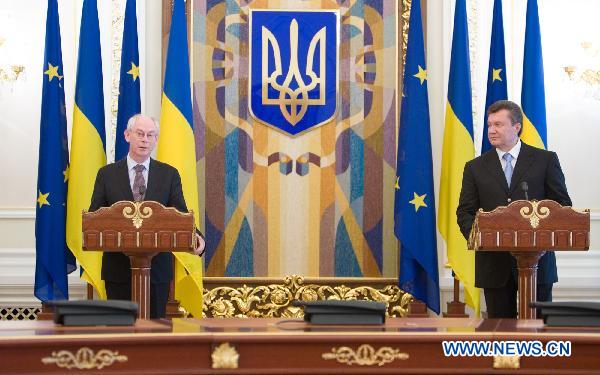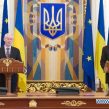
Ukraine Achieves Limited Progress in EU Integration
Publication: Eurasia Daily Monitor Volume: 7 Issue: 214
By:

In November, the European Union offered Kyiv a plan for visa-free travel and the European parliament recognized that Ukraine has a right to apply for EU membership. Previous Ukrainian governments, perceived in Europe as more pro-European than the current one, could not boast such achievements. At the same time, it was made clear to Kyiv that if the situation with democracy continued to deteriorate, Brussels might change its stance. Also, Kyiv failed to complete association agreement talks by the end of 2010 as it had hoped. The next two years will show whether the government of President Viktor Yanukovych is serious about EU integration. Kyiv plans to sign an association agreement with the EU and meet the EU’s conditions for visa-free travel in 2011, and in 2012 Ukraine will have to demonstrate adherence to European values by holding free and fair parliamentary elections.
On November 22, Yanukovych paid his third visit to Brussels in 2010, this time for a EU-Ukraine summit. As expected, the EU offered Ukraine an action plan towards establishing a visa-free regime for short stays. Europeans, along with other Western nations, have been traveling to Ukraine without visas since 2005. Yanukovych’s predecessors hoped that the EU would soften its visa rules in response, but this did not occur. In order to qualify for visa-free travel for its citizens, Ukraine must introduce biometric passports, curb illegal migration and step up its fight against organized crime, drug trafficking and human trade. Yanukovych said Ukraine would meet all the conditions next year, although he admitted this would be a formidable task (Kommersant-Ukraine, November 23).
Unlike Yanukovych hoped earlier in the year, no association agreement on deepening Ukraine’s political association and economic integration with the EU was signed. The two sides failed to agree on trade quotas and duties, although they did concur that respective talks should be completed next year. European leaders did not conceal that problems with democracy in Ukraine may stand in the way of signing the agreement. EU Council President, Herman Van Rompuy, told Yanukovych that Ukraine should share the values of democracy, the rule of law and respect for human rights if it wanted to join the European family. He expressed concern over reports of unfair play by Yanukovych’s ruling Party of Regions (PRU) in the October 31 local elections (Ukrainska Pravda, November 22).
The European parliament was even more outspoken in its assessment of the current situation in Ukraine, as its resolution on Ukraine passed on November 25 expressed concern over reported pressure on the media, politicization of the security service (SBU), and the government’s failure to guarantee the opposition parties’ rights in the October 31 elections. Moreover, the EU suggested that the SBU’s activities should be investigated. SBU chief Valery Khoroshkovsky is reportedly linked to the oligarch, Dmytro Firtash, and controls the country’s most popular TV, Inter, hence a conflict of interests exists and accusations abound of violations of media freedoms at home and abroad (EDM, June 24). The resolution could have been even tougher on the Yanukovych government’s attitude to democratic values but for the partnership relations established between the PRU and the Socialists in the European parliament. The Socialists blocked an earlier, tougher version of the resolution which was backed by the right-of-center People’s Party (Kommersant-Ukraine, November 26).
On the positive side, the European parliament welcomed the visa liberalization plan offered by the EU and urged its members to abolish visa fees for Ukrainians as well as declaring that Ukraine has the right to apply for EU membership (Kommersant-Ukraine, November 26). This was unusual, as European bodies usually deliberately avoid any mention of possible EU membership for Kyiv. That is why, despite all the criticism contained in the resolution, the Ukrainian foreign ministry welcomed the document. It stressed that the European parliament had for the first time recognized Ukraine’s right to join the EU. The ministry’s spokesman, Oleg Voloshyn, said that Kyiv would address the concerns raised by Brussels and “take all the necessary measures to bring national legislation and law enforcement practices into full correspondence with the highest European standards” (Ukrainska Pravda, November 25).
While actively negotiating with the EU, the Yanukovych government has abandoned the NATO integration strategy which was pursued by its predecessors, which suits Moscow. Russian President, Dmitry Medvedev, said after meeting Yanukovych on November 26 that Ukraine’s membership in NATO would upset the security balance in Europe (UNIAN, November 26). Yanukovych ignored the November 19-20 NATO summit in Lisbon. Ukrainian Foreign Minister, Kostyantyn Hryshchenko, explained his absence in Lisbon by the need to thoroughly prepare for the EU-Ukraine Summit on November 22 (Interfax-Ukraine, November 20). Nevertheless, NATO said in a resolution adopted at its summit that it respects Kyiv’s policy of non-bloc status and that NATO’s doors would remain open to Ukraine as decided at the 2008 NATO summit in Bucharest.




